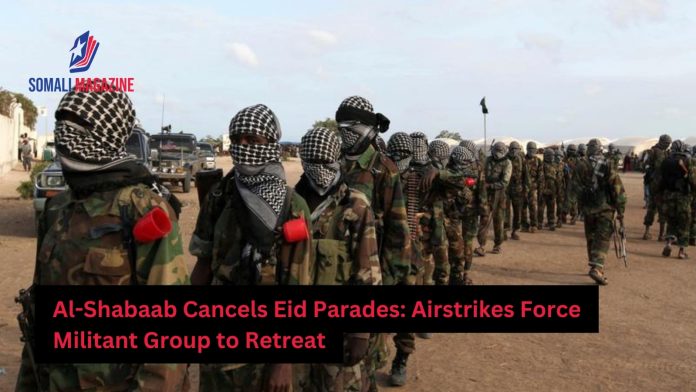Facebook Twitter Instagram Somali Magazine - People's Magazine
The al-Qaeda-linked militant group Al-Shabaab has canceled its annual Eid al-Fitr military parades in Somalia, citing intensified airstrikes and military operations targeting its strongholds. The decision marks a significant shift in the group’s activities, as the parades have historically been used to showcase its military might and propaganda during the festive season.
Reports from Al-Shabaab-controlled areas, including Galheeri in Galguduud, Jilib in Middle Jubba, and Mubaarak in Lower Shabelle, indicate that senior leaders of the group were notably absent from public Eid celebrations. Instead, they participated remotely by sending recorded messages to their followers. Residents in these regions reported a subdued atmosphere, with no visible presence of Al-Shabaab leaders at prayer sites or public gatherings.
The cancellation of the parades comes amid a series of targeted airstrikes by Somali and international forces, including the United States Africa Command (AFRICOM). These strikes have significantly weakened Al-Shabaab’s operational capacity, disrupting its logistics and eliminating key figures within the group. Military analysts suggest that the intensified airstrikes have forced Al-Shabaab to adopt a lower profile, avoiding large-scale public displays that could become targets.
In addition to the airstrikes, Somali government forces have ramped up ground operations against Al-Shabaab in regions such as Middle Shabelle and Lower Jubba. The coordinated efforts have reclaimed territory from the militants and disrupted their supply chains, further diminishing their ability to organize public events like the Eid parades.

Al-Shabaab’s decision to cancel the parades has been interpreted as a sign of the group’s declining influence and operational challenges. The parades, which have been a hallmark of Al-Shabaab’s propaganda strategy, were used to recruit fighters, intimidate local populations, and demonstrate its resilience. Their absence this year underscores the growing pressure on the group from Somali forces and their international allies.
The Somali government has welcomed the development as a positive step in its ongoing fight against terrorism. President Hassan Sheikh Mohamud praised the intensified military operations and airstrikes, emphasizing the importance of sustained efforts to eliminate Al-Shabaab’s presence in Somalia. “The cancellation of these parades is a testament to the progress we are making in weakening Al-Shabaab’s grip on our nation. We remain committed to restoring peace and stability for all Somalis,” the president stated.
Despite these successes, challenges remain in the fight against Al-Shabaab. The group continues to carry out deadly attacks, including bombings and ambushes targeting civilians and security forces. Analysts warn that while the cancellation of the parades is a symbolic victory, it does not signal the end of Al-Shabaab’s threat to Somalia and the broader region.
Humanitarian organizations have also expressed concern about the impact of ongoing military operations on civilians in conflict-affected areas. Displacement, food insecurity, and limited access to healthcare remain pressing issues for communities caught in the crossfire. Aid agencies have called for increased support to address these challenges and ensure the safety and well-being of affected populations.
As Somalia intensifies its efforts to combat Al-Shabaab, the focus remains on dismantling the group’s infrastructure and addressing the root causes of extremism. The cancellation of the Eid parades serves as a reminder of the progress being made, but also of the work that lies ahead in achieving lasting peace and stability.

